Pope Francis

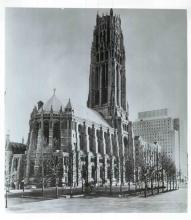
On a Greenwich Village street where male prostitutes seeking customers shout out their dimensions, I walked past an open but empty church on my way to the subway.
In times past, flocking to church on Sunday morning was a beloved family routine, even here in bad old Gotham. Now they’re trying nontraditional worship on Sunday evenings.
It’s a struggle, both here and elsewhere in the 21st-century Christian world. Buildings with “beautiful stones and gifts dedicated to God,” as Luke described the temple in ancient Jerusalem, are falling into disuse and disrepair — not because Caesar attacked and took revenge on an alien religion, but because the world changed and gathering weekly in “Gothic piles” no longer seems necessary for finding faith.
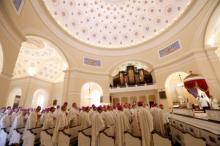
As the U.S. Catholic bishops began their annual fall meeting on Monday, they were directly challenged by Pope Francis’ personal representative to be pastors and not ideologues — the first step of what could be a laborious process of reshaping the hierarchy to meet the pope’s dramatic shift in priorities.
“The Holy Father wants bishops in tune with their people,” Archbishop Carlo Maria Vigano, the Vatican ambassador to the U.S., told the more than 250 American churchmen as he recounted a personal meeting in June with Francis.
The pontiff, he added, “made a special point of saying that he wants ‘pastoral’ bishops, not bishops who profess or follow a particular ideology,” Vigano said. That message was seen as an implicit rebuke to the conservative-tinged activism of the bishops’ conference in recent years.
Almost since his election in March, Francis has signaled that he wants the church to strike a “new balance” by focusing on the poor and on social justice concerns and not overemphasizing opposition to hot-button topics like abortion and contraception and gay marriage — the signature issues of the U.S. bishops lately.

First, the name “Francesco” leapfrogged to No. 1 on the list of the most popular baby names in Italy.
Then, the city of Rome reported a tourism boom, mostly from Latin America.
Now, there’s word Roman Catholic Church attendance is climbing throughout Italy.
Blame it on “the Francis effect.”
Italy’s Center for Studies on New Religions reported Sunday that around half of the 250 priests it surveyed reported a significant rise in church attendance since Cardinal Jorge Mario Bergoglio became Pope Francis in March.
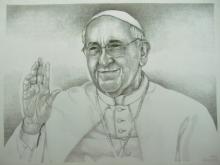
When the nation’s Catholic bishops gather on Monday for their annual fall meeting in Baltimore, one of their chief duties will be choosing a new slate of leaders to guide the American hierarchy for the next three years.
But the more than 200 prelates will also be looking over their heads — and maybe their shoulders — to the Vatican to gauge what Pope Francis’ dramatic new approach means for their future.
If Francis has made one thing clear in his nearly nine months on the job, it is that he wants the church to radically change its tone and style, starting at the top. The pontiff has repeatedly blasted careerism among churchmen and ripped “airport bishops” who spend more time jetting around the globe — and to Rome — rather than being pastors who go out to their flock and come back “smelling of the sheep,” as he likes to put it.
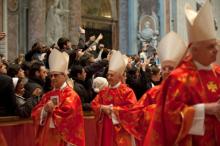
The Vatican on Monday moved to quash speculation that at least two women would be among the cardinals that Pope Francis will name in February, saying such a move was “not a realistic possibility.”
Over the weekend, Irish media reported that Francis could name Linda Hogan and Mary McAleese as cardinals. Both are associated with Trinity College in Dublin: Hogan as a professor of ecumenism, and McAleese, the former president of Ireland, as a former professor.
Some Italian media that carried the story speculated that Cecile Kyenge, the Congo-born Italian minister of integration, could be a candidate as well. Kyenge is a devout Catholic and a graduate of the Catholic University of the Sacred Heart in Milan.
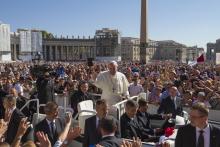
In an unsurprising move, last week Pope Francis issued a questionnaire of sorts to the world’s Catholics to find out what we think about issues related to the family. He wants to know what we think about contraception, same-sex unions, and communion for divorced and remarried couples.
The Vatican has asked the world’s bishops to distribute the survey “immediately and as widely as possible to deaneries and parishes so that input from local sources can be received,” according to a letter from Archbishop Lorenzo Baldisseri, secretary of the Synod of Bishops. A copy of Baldisseri’s letter was obtained by National Catholic Reporter.
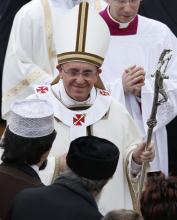
In an unusual move, the Vatican has asked the world’s bishops to quickly canvas the faithful for their views on topics like gay marriage, divorce, and birth control ahead of a major meeting of church leaders set for next fall.
But it’s not clear how or whether the American bishops will undertake such an effort, or if they will only send their own views to Rome.
The letter from the Vatican to New York Cardinal Timothy Dolan, president of the U.S. Conference of Catholic Bishops, was dated Oct. 18 and it asked that a series of questions be shared “immediately as widely as possible to deaneries and parishes so that input from local sources can be received” in time for a February planning meeting in Rome.
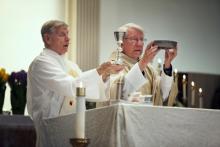
While the first months of Pope Francis’ pontificate have been marked by his attention to the poor and his “Who am I to judge” attitude on homosexuality, his pledge to tackle the ban on Communion for divorced and remarried Catholics could have the biggest impact for Catholics in the pews, especially in the U.S.
The current policy has caused what some call a “silent schism,” and bishops around the world concede that the ban has alienated untold numbers of Catholics and their families.
“I think this is the moment for mercy,” Francis told reporters when asked about remarried Catholics during a wide-ranging news conference on the plane back to Rome from Brazil in July.
Like the gay issue, Francis seems to favor a more pastoral approach to the equally perplexing question of “invalid” marriages — couples who remarry outside the church without getting an annulment, or those who do not get married in church in the first place.
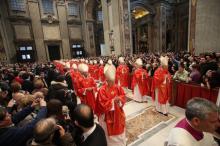
The National Security Agency spied on cardinals as they prepared to select the new pope — perhaps including even Cardinal Jorge Bergoglio, who emerged from last spring’s conclave as Pope Francis, a leading Italian news magazine reported in Wednesday’s editions.
Pope Francis still lives in the guesthouse, but the magazine did not speculate whether the phones there were still tapped.

At a speech in St. Peter's Square, Pope Francis was joined on stage by an incredibly cute young boy.
As NPR reports:
Protocol is a concept that's often lost on young children and this boy – part of a group of children invited to sit near the pontiff during a speech — didn't see any reason why he shouldn't hang out for a bit with the guy in white.
The Telegraph provides a video and this quote:
The unidentified boy refused to leave the Pope's side, clinging to his legs while two Cardinals tried to encourage him to sit back down with sweets.
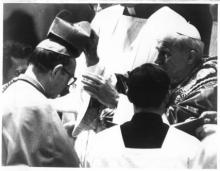
The election of Pope Francis in March heralded a season of surprises for the Catholic Church, but perhaps none so unexpected – and unsettling for conservatives – as the re-emergence of the late Chicago Cardinal Joseph Bernardin as a model for the American Catholic future.
While there is no indication that Francis knows the writings of Bernardin, who died in 1996, many say the pope’s remarks repeatedly evoke Bernardin’s signature teachings on the “consistent ethic of life” – the view that church doctrine champions the poor and vulnerable from womb to tomb – and on finding “common ground” to heal divisions in the church.
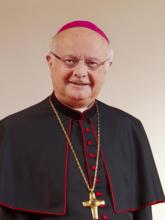
The $20,000 bathtub and $482,000 walk-in closets ordered by “Bishop Bling-Bling” — the moniker of Franz-Peter Tebartz-van Elst, the now-suspended bishop of Limburg — have scandalized the German public.
But Tebartz-van Elst, 52, is only the latest German clergyman to run into trouble since Pope Francis took the helm of the Roman Catholic Church. Francis temporarily suspended the bishop on Wednesday while a church commission investigates the expenditures on the $42 million residence complex.
As the new pontiff tries to reform the way the church does business, German dioceses, which reportedly include the world’s wealthiest in Cologne, are chafing under the new direction as membership numbers continue to dwindle.
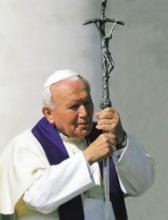
Vatican officials say they expect next year’s celebration for the canonizations of former popes John Paul II and John XXIII to be attended by as many as 100 heads of state in what is likely to be the biggest draw to the city since John Paul’s funeral in 2005.
The crowd estimates were made Tuesday, the feast day for John Paul. This will be the last time he will be venerated as Blessed Pope John Paul II; after the canonization ceremony on April 27, 2014, he will be known as St. Pope John Paul II.
John Paul’s 2005 funeral may have been the single largest gathering in Christian history, with estimates as high as 4 million mourners gathered in the Italian capital, along with at least 80 presidents, prime ministers, and monarchs.

The rite of baptism got big press as Archbishop of Canterbury Justin Welby christened Prince George, a future king of England on Wednesday.
Welby made it a teachable moment for a country where only one in six are baptized. In a YouTube video, he explains that by bringing their son forward for baptism, Prince William and Duchess Catherine are “bringing God into the middle of it all.”
Last month, Pope Francis gave the sacrament a boost when he called a pregnant, unmarried woman to encourage her faith and offered to baptize her baby. While his main message was anti-abortion, his call also reminded Catholics that children of unmarried parents are welcome in the church.
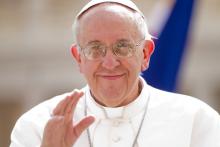
Reversals of power play through many stories and poems of Scripture. The sacred texts foundational to Jewish and Christian identity are insistent in their efforts to reconfigure our understanding of what counts as valuable and holy. Daring leaders in every age have responded with their own bold visions regarding what makes for faithful community — something we can see in the unusually humble ministry of the new Bishop of Rome. Pope Francis clearly knows his Scripture!
Featured prominently in Old Testament stories are flawed ancestors, unexpected heroes, surprising protagonists whose vital roles in the purposes of God reframe the community’s perspective on faith lived out in the paradoxes of history. The trickster who overcomes stronger antagonists (Jacob), the leader whose capacity for greatness develops from a compromised start (Moses), marginalized women whose very vulnerability becomes the source of their power (Tamar, Rahab, Ruth), the prophet whose witness is initially scorned but whose authority endures for generations (the Suffering Servant in Isaiah): such figures delight the reader seeking to understand how community should be deconstructed and rebuilt according to the purposes of God. In the New Testament, and particularly in Luke, we see sustained attention to those on the margins of social power: women, the poor, those with catastrophic illness. Christ himself surrenders his status and power (John 13:1-15; Philippians 2:5-11) in order to serve others in love. His abjection invites them, and us, into a new understanding of community.

Moved by the election of Pope Francis seven months ago, the name “Francesco” has leapfrogged to No. 1 on the list of the most popular baby names in Italy, according to a study.
The study, conducted by Enzo Caffarelli, who researches the origins of names at Rome’s Tor Vergata University, along with telephone directory publisher Seat PG Italia, also showed a trend toward re-naming streets, town squares, and parks for St. Francis of Assisi, the pontiff’s namesake.
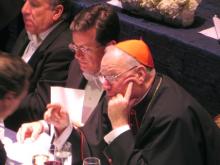
The great and the good — and lots of politicians and TV pundits, too — gathered Thursday to hear comedian Stephen Colbert roast and toast everyone from Pope Francis to his host for the evening, Cardinal Timothy Dolan.
The 68th annual Al Smith Dinner, named for the first Catholic presidential candidate in American history, at the Waldorf Astoria hotel raised $3 million for New York’s neediest children.
Colbert is a lifelong Catholic, a man who is, as Alfred E. Smith IV said in introducing him, “serious about both his craft and his Catholic faith.” The cardinal — who is also pretty funny — and the comedian first met last fall, and Colbert had Dolan on his show last month. So the archbishop of New York returned the favor by having Colbert headline the dinner.
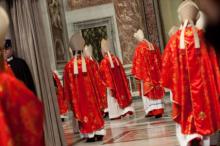
Could a woman vote for the next pope?
Pope Francis has said repeatedly that he wants to see greater roles for women in the Catholic Church, and some argue that he could take a giant step in that direction by appointing women to the College of Cardinals – the select and (so far) all-male club of “Princes of the Church” that casts secret ballots in a conclave to elect a new pope.
Whether it’s even possible is a matter of debate. But that hasn’t stopped the feverish speculation, which was sparked last month by an article in a Spanish newspaper in which Juan Arias, a former priest who writes from Brazil, wrote that the idea “is not a joke. It’s something that Pope Francis has thought about before: naming a woman cardinal.”
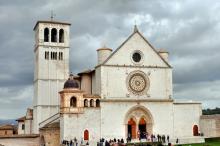
Ancient stones, steep stairs, and sparkling fresh air greeted me upon arrival in Assisi, Italy, a month ago. Lush olive groves, leaves iridescent in the sun, offset the city stones. “What sort of place is this, that shaped St. Francis 800 years ago?” I asked myself. Eager to deepen my understanding of the saint, I had returned to Assisi to walk in the footsteps of St. Francis.
Profligate playboy, drama king, dejected knight, young Francis lived life large. He grew up in turbulent times, with civic unrest in Assisi and war with nearby Perugia surrounding him. Returning from a year as a prisoner of war in Perugia, sick and weak, Francis drifted. When he sold his cloth merchant father’s wares to repair a church, his father chained him in punishment. Francis stripped in public, denouncing his father. Unlikely material for a saint.
Yet God shaped Francis over time, and Francis yielded. A simple saint, Francis wanted one thing. Nothing but God, he proclaimed, shedding all else. He chose a life of simplicity, serving the poor, and calling the church to reform.

Today, Oct. 4, Christians around the world remember one of the great heroes of our faith, and the current pope’s namesake – Francis of Assisi. But Francesco Bernadone (Francis of Assisi), who died on Oct. 3, 1226, must be laughing at the irony of it all.
He was one of the first critics of capitalism, one of the earliest Christian environmentalists, a sassy reformer of the church, and one of the classic conscientious objectors to war. Even though it’s hard to imagine a saint whose life is more relevant to the world we live in today, Francis was not always so popular.
Legend has it, the first time he preached at the Vatican, the pope told him to go preach to the pigs. But later the pope had a vision: the corner of the church was collapsing, and little Francis and the youth of Assisi were holding it up. Arguably that youth movement was one of the most powerful restorations of church history. While he did not hold back on his relentless critique of the church, he remained humble and hopeful. He stopped complaining about the church as it was and started dreaming of the church as it could be. As Francis said, he heard God whisper: “Repair my Church, which is in ruins.”
So perhaps it’s providential that 800 years later the pope is named after him.